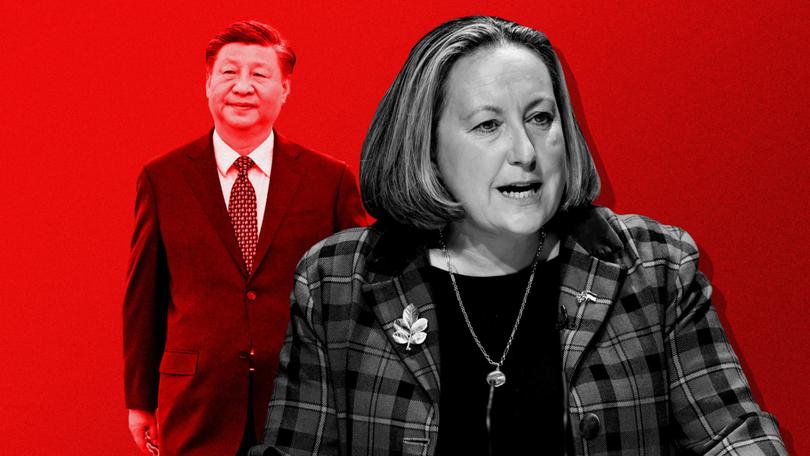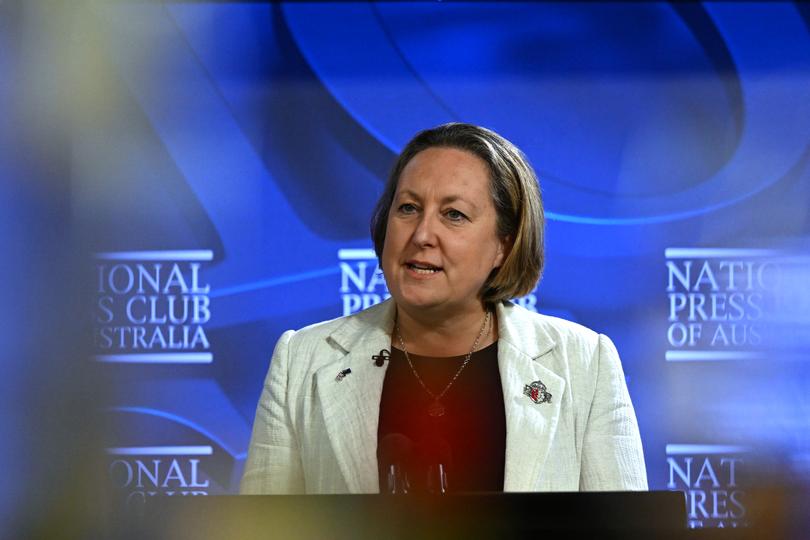UK’s former Indo-Pacific Minister Anne-Marie Trevelyan urges Australia to ramp up ‘war readiness legislation’
A former top British MP has urged UK and Australia to prepare war readiness legislation as part of its deterrence measures.

The UK’s former Indo-Pacific Minister has urged Australia to prepare war-readiness legislation as a deterrence measure and said if Western countries didn’t step up and try to stop Beijing’s aggression we may as well all learn Mandarin.
Anne-Marie Trevelyan, who travelled frequently to Australia in her roles as Indo Pacific Minister and as former Secretary of State for International Trade, also blamed Australia’s bureaucratic culture for what she said was the slower-than-necessary progress being made on AUKUS.
Speaking to the Bourke & Ryan podcast in her first extended interview since the Conservatives lost government in July and she lost her own seat, Ms Trevelyan said the UK and Australia needed to prepare war readiness legislation as part of its deterrence measures.
Sign up to The Nightly's newsletters.
Get the first look at the digital newspaper, curated daily stories and breaking headlines delivered to your inbox.
By continuing you agree to our Terms and Privacy Policy.“That is one of the challenges I set government and they hated it – which is, where is our pull-open-the-drawer and go ta-da, preparedness for war plan?” she said.
“Where is that at?”
She likened the need for such legislation to the emergency laws passed for the pandemic, which swept away red tape and enabled the UK to fast-track the development and approval processes for the AstraZeneca vaccine produced by Oxford’s Professor Sarah Gilbert in record time.
“Do we all need a bit of legislation which is, we are in a not war but something else state of mind and you all need to be doing business differently?” she said.
“I had yet to persuade my government and your government could do with thinking about it too.
“It would of course have cost implications which is why no one wants to do it.
“And if it works then it’s wasted money as the Treasury would always say.”

She said it was wrong to assume that President Xi Jinping would be deterred from military action because of China’s economic dependencies including on Australian iron ore.
“For me that should mean that’s actually quite disincentivising from China wanting to do anything stupid with Taiwan because the impacts would be very expensive,” she said.
“But the Russians seem to have a capacity to live in poverty in a really tough environment because their leader says we’re going this way and they say ‘OK’.
“When it’s not a rational set of behaviours by a leader and their militaries you can’t assume that they will behave rationally.
“We saw that with Russia.”
Asked about the UK’s level of defence spending, she said while the Conservatives had overseen spending above NATO’s required 2 per cent of GDP, the figure was irrelevant.
“But do you know what, it doesn’t matter if it’s four or five (per cent),” she said.
“If it’s not enough we may as well all go home and I don’t know, learn Mandarin.”
Earlier this month, Australian ambassador to the United States Kevin Rudd warned that China was ready to escalate military action with President Xi’s appetite for risk growing.
And Britain’s new head of army Sir Roly Walker has said the West has just three years left to prepare for war against the axis of upheaval caused by China, Russia, Iran and North Korea’s increased collaboration and supply of weapons since Vladimir Putin invaded Ukraine in February 2022.
Ms Trevelyan was part of the Government that agreed to AUKUS, the partnership to allow Australia exclusive access to the US and UK’s nuclear submarine technology.
The ambitious plan to acquire ready-made boats from the US Navy and then co-build a brand new submarine with the British is aimed at protecting and defending the Indo-Pacific and its critical maritime trading routes from Chinese domination.
Ms Trevelyan said while China would not be frightened by the submarine acquisition given the SSN AUKUS design won’t even start being built until the late 2030s, the secondary program to build new weapons together, such as hypersonic missiles, would have more of an immediate effect.
But she sounded an alarm over the pace of AUKUS, which she said was going slower than it had to, something she blamed on Canberra’s unwillingness to listen to overseas advice.
“These are the hardest things on the planet that we do from an engineering perspective and you guys are coming from a standing start,” she said.
“For me, I spent a lot of time with a lot of your politicians and indeed your civil servants and your industrial base which is relatively small.
“There’s an assumption that it’s not that hard, that it wants to be Australian and sovereign, of course, that’s completely understood.
“But you won’t get there unless you allow the British and US experts to come in and help teach you and there is a gap there still in how that is achieved.
“And that’s a problem because we could be a lot further along than we are.”
She said Australia’s bureaucratic mindset was a detriment.
“It will progress, it will muddle on, more slowly than it needs to unless that mindset can change,” she said.
The Australian Submarine Agency says it plans to begin building the first SSN-AUKUS boat in Adelaide at the end of this decade and deliver it in the early 2040s.

